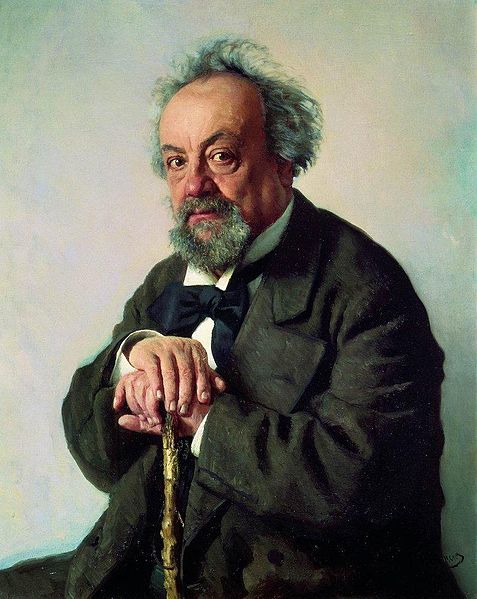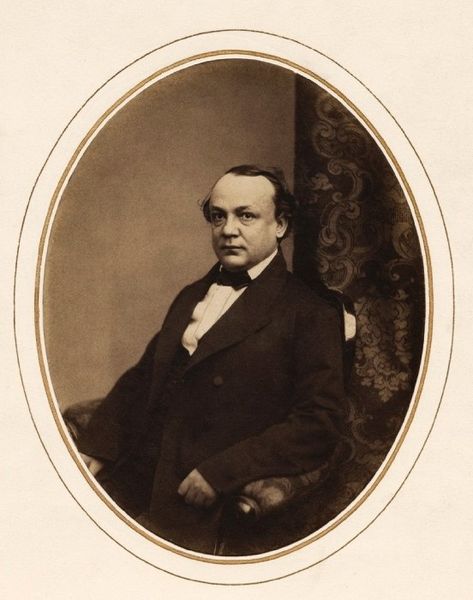<Back to Index>
- Geologist William "Strata" Smith, 1769
- Writer Aleksey Feofilaktovich Pisemsky, 1821
- Governor General of Angola José Maria Mendes Ribeiro Norton de Matos, 1867
PAGE SPONSOR


Aleksey Feofilaktovich Pisemsky (Russian: Алексе́й Феофила́ктович Пи́семский ) (March 23 [O.S. March 11] 1821 - February 2 [O.S. January 21] 1881) was a Russian novelist and dramatist who was regarded as an equal of Ivan Turgenev and Fyodor Dostoevsky during his lifetime, but whose reputation suffered a spectacular decline in the 20th century. A realistic playwright, along with Aleksandr Ostrovsky he was responsible for first dramatising ordinary people in the theatre of Russia. D.S. Mirsky said: "Pisemsky's great narrative gift and exceptionally strong grip on reality make him one of the best Russian novelists."
His first novel Boyarschina (Боярщина, 1847 [published 1858]) was originally forbidden for its unflattering description of the Russian nobility. His principal novels are The Muff (Тюфяк- translated into English as The Simpleton), 1850; One Thousand Souls (Тысяча душ, 1858), which is considered his best work of the kind; and Troubled Seas (Взбаламученное море), giving a picture of the excited state of Russian society about the year 1862. He also wrote plays, including A Bitter Fate (Горькая судьбина, also translated as "A Hard Lot"), which depicts the dark sides of the Russian peasantry. The play has been called the first Russian realistic tragedy; it won the Uvarov prize of the Russian Academy.
Aleksey Pisemsky was born on his father's
estate in the province of Kostroma.
In his autobiography, he describes his family as belonging to the
ancient Russian nobility, but his more immediate progenitors were all
very poor and unable to read or write. His grandfather ploughed the
fields as a simple peasant, and his father, as Pisemsky himself said, was washed and clothed by a rich relative, and placed as a soldier in the army,
from which he retired as a major after thirty years of service. During childhood, Pisemsky read eagerly the translated works of Walter Scott and Victor Hugo, and later those of Shakespeare, Schiller, Goethe, Rousseau, Voltaire and George Sand.
From the gymnasium of Kostroma he passed through Moscow State University, and in 1844 entered the government service as a clerk in his native province. Between 1854 and 1872, when he finally quit the civil service, he occupied similar posts in St. Petersburg and Moscow. His early works exhibit a profound disbelief in the higher qualities of humanity, and a disdain for the opposite sex, although he appears to have been attached to a particularly devoted and sensible wife.
His first work to appear in print was the obscure short story Nina, in 1848. His short novel The Simpleton, the story of a young idealist who dies after his illusions have been destroyed, gained him more attention. With the publication of The Simpleton, and with the help of his friend Alexander Ostrovsky, he was soon accepted into the circle of the leading Moscow literary journal of the 1850s Moskvityanin. There he published his first play The Hypochondriac, and his first work in a three part cycle called Sketches of Peasant life, which made his reputation as a chronicler of the life of the common people.
In 1854 he moved from Kostroma to St.Petersburg. The literary society of St. Petersburg regarded him as a coarse peasant with few social graces and a provincial accent. This did not prevent him, however, from achieving a solid career in literature, and by the end of the 1850s his reputation was at its peak.
In 1856 he was sent, together with other literary men, to report on the ethnographical and commercial condition of the Russian interior, his particular field of inquiry being Astrakhan and the region of the Caspian Sea.
In 1858 he joined the staff of the literary journal Biblioteka Dlya Chteniya, and later became its editor. He also published his popular novel One Thousand Souls in 1858. The Title One Thousand Souls refers to the number of serfs a landowner had to have in order to be considered wealthy. His play A Bitter Fate was published in 1859, and his short novel An Old Man's Sin in 1861.
His scepticism in regard to the liberal reforms of the sixties made him very unpopular among the more progressive writers of that time. During the early 1860s he published a series of satirical articles attacking the radical intelligentsia. The negative response to them led Pisemsky to move to Moscow in 1863, where he lived for the rest of his life. He made a fictional reply to his enemies with the publication of his long novel Troubled Seas (1863).
He started to drink heavily, and avoided appearing in public during the last decade of his life. He died in Moscow in 1881, only a week before the death of Fyodor Dostoyevsky.